|
This delicious vegan banana bread can be made in one bowl using a high speed blender, leaving little for washing up. You can replace the walnuts for a chocolate vegan banana bread bread for a more indulgent take on the recipe.
If you don't have wholemeal spelt flour, you can use regular wholemeal flour. I definitely prefer this over white flour, for a wholemeal healthy vegan banana bread option. This is a super simple vegan banana bread recipe that you will love and have on repeat for an easy afternoon tea or after dinner treat. It’s fluffy and moist, and delicious served warm from the oven or toasted afterwards. Using dates instead of sugar is a great way to add more nutrition while still adding sweetness. Instructions Wholemeal Spelt Banana Bread
Serve with lemon cashew curd. (Recipe below) Lemon cashew curd
Be sure to comment below if you make this recipe and let me know your feedback. Steph xxx
0 Comments
Plant based meals in a flash. Create quick and healthy, balanced whole food plant based meals.
Pro tip - Plan your meals for the week and prep your food for quick and healthy meals. Vary your food choices from each category below for the best health outcomes. Serve sizes are a guide only. Calculate your protein needs first and work around that. Start with your Protein:
Add Your Whole grains:
Then Add Your Veggies:
Boost Your Flavour with Dressing/sauce options:
Additional Plant Based Health Boost
plantbasedmeals, createquickveganmeals healthyveganeats healthyvegancooking easyveganmeals easyplantbasedmeals fastveganmeals 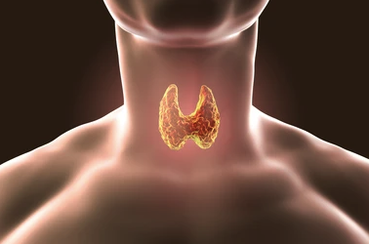 The thyroid gland requires iodine The thyroid gland requires iodine Have you been feeling more tired of late, struggling to lose weight, or just not feeling like yourself? It could be worth ensuring you are getting sufficient iodine in your daily diet. The mineral iodine is essential for healthy thyroid function and overall health. Iodine is most commonly found in seafood, iodised table salt, fortified bread and previously in dairy products. If you follow a vegan or plant predominant diet it's important to ensure you are getting enough. How much iodine do you need? Age in years Recommended Daily Intake (RDI) - Iodine per day 1 to 8 90 ug 9 to 13 120 ug 14 to > 70 150 ug Pregnancy 220 ug Adapted from National Health and Medical Research Council Why do we need iodine? The thyroid gland requires iodine to produce hormones that are essential for growth and development, metabolism, and mental function. An iodine deficiency can impair thyroid hormone production, a condition known as hypothyroidism. Fatigue and muscle weakness, among other symptoms, are common symptom of hypothyroidism. How can I obtain sufficient iodine on a plant based or vegan diet? One option is to choose iodised salt. About 1/2 teaspoon of iodised salt provides around 120 ug to 150 ug iodine. Sea salt and other specialty salts are not usually iodised, so it's important to check the label if you're not sure. It's worth noting that some people may need to reduce salt intake for health reasons, so this may not be the best option for everyone. Another great vegan source of iodine is seaweed. Sea vegetables are naturally rich in iodine and can be found in many forms. It is important to not over consume seaweed, as too much iodine can actually be harmful. Kelp is particularly rich in iodine and easy to exceed the RDI, so wakame, dulse and nori are a better options. Vegan Iodine sources include: Sea Vegetables Serve size to provide approximately 150ug iodine Wakame 2 - 3 teaspoons Dulse 1 - 2 teaspoons Nori. 1 - 2 teaspoons Adapted from Smyth (2021) Testing and Supplements: If you are concerned about your iodine intake or lack of energy, a urine test can determine your iodine status. It's important to note, that healthy thyroid hormone production also requires selenium and tyrosine among other nutrients. Brazil nuts and firm tofu provide good amounts of these nutrients. Iodine can also be taken as a supplement, however I would recommend first testing your iodine levels as recommended above. If you want support to improve your nutrition and energy, book in for a free 15 minute phone consultation to see how I can help. Iodine, vegan nutrition, iodine on a vegan diet, iodine health benefits, iodine for energy, iodine for weight loss, Sydney plant-based nutritionist Bondi based vegan nutritionist vegan nutritionist Sydney nutritionist Bondi Sydney plant-based nutritionist, Bondi based vegan nutritionist, vegan nutritionist Sydney, nutritionist Bondi Sydney plant-based nutritionist, Sydney vegan nutritionist, Bondi based vegan nutritionist, Bondi nutritionist As a plant based nutritionist, I am often asked about protein on a plant based diet. The thing is, if you are consuming sufficient calories from a varied whole foods diet, you are more than likely getting enough protein. To understand where the research is at with optimal protein intake, read on.
A one day eating guide focusing on protein. 1.2g of protein per kilogram of body weight is recommended for optimal health (PMID: 29635313). So if you weigh 70kg, you should aim for around 84 grams of protein per day. This should be calculated on your healthy body weight. If you are looking for muscle growth on a training program, up to 1.6g per kilogram of bodyweight is recommended (DOI:10.1136/bjsports-2017-097608). Nutrition Guide: The following one day, whole foods plant based diet, provides: Protein - 81.9g, including Leucine 5.3g This diet exceeds recommended amounts of fibre, calcium, vitamin A, vitamin C, folate and potassium. Breakfast - Overnight oats Oats, .5 cup Soy Milk, 1 cup Hemp seeds, 1 tbsp Ground flaxseeds, 1 tbsp Raspberries, .5 cup Lunch - Quinoa, kale and tofu salad Tofu, 150g Kale, 1 cup Quinoa, cooked, .5 cup Pumpkin seeds, 2 tbsp Snack Banana, 1 medium Walnuts, 0.25 cup Dinner - Lentils with sweet potato and amaranth Lentils, cooked, .5 cup Tomato, canned, .5 cup Mushrooms, cooked, .5 cup Broccoli, cooked, .5 cup Sweet potato, cooked, .5 cup Amaranth, cooked, .5 cup Ingredients: |
| Sleep Poor sleep can have major impact on our moods. There are many factors that can affect the sleep such as kids, a demanding job or stress from everyday life. But did you know your sleep disturbances may be caused by internal issues including vitamin and mineral deficiencies, impaired neurotransmitters, poor gut health, chronic stress, perimenopause, low blood sugar, etc. As a Sydney vegan nutritionist, we can work through what may be impacting your sleep, and work on diet based strategies to improve upon your experience. |
Gut Microbiome
The gut Microbiome was discussed in greater depth in our last blog (Which you can check out here)
The role of the gut microbiome in mental health is currently receiving considerable research interest [117]. Since the microbiome appears to be influenced by exercise [118] and diet [119], Altering our daily exercise and diet behaviours could present another pathway through which modifiable health behaviours could impact mental health.
However, we must always consider that the basis behind mental disorders is of course multifactorial, and cases will often occur (and persist) independently of lifestyle factors. So we cannot attribute the causes solely to the behaviours of individuals.
As a Sydney plant-based nutritionist, I understand there are many defining factors to mental health. However, I am dedicated to helping you develop a healthy lifestyle that can help you manage the internal factors that may be affecting your mental health.
The gut Microbiome was discussed in greater depth in our last blog (Which you can check out here)
The role of the gut microbiome in mental health is currently receiving considerable research interest [117]. Since the microbiome appears to be influenced by exercise [118] and diet [119], Altering our daily exercise and diet behaviours could present another pathway through which modifiable health behaviours could impact mental health.
However, we must always consider that the basis behind mental disorders is of course multifactorial, and cases will often occur (and persist) independently of lifestyle factors. So we cannot attribute the causes solely to the behaviours of individuals.
As a Sydney plant-based nutritionist, I understand there are many defining factors to mental health. However, I am dedicated to helping you develop a healthy lifestyle that can help you manage the internal factors that may be affecting your mental health.
Exercise
Exercise, some love it, some hate it, some just simply do not have time for it whether it be kids or work. There is now some evidence in exercise, muscular strength and resistance training in the prevention of mental illness.
But some of you must be questioning, what is the appropriate amount of time to exercise? We understand, there is so much conflicting advice. Well, In order to preserve both overall mental health and cognitive functioning, both Canada's [15] and Australia's [16] 24‐Hour Movement Guidelines have adopted a “whole day time‐use” paradigm for young people, recommending that each day should include at least 60 min of moderate‐to‐vigorous exercise, several hours of light physical activity, no more than two hours of sedentary leisure activities, and 8‐11 hours of uninterrupted sleep.
Here at Planting Nutrition, not only am I a Bondi based vegan nutritionist, but I am also a certified personal trainer, so I appreciate and understand the importance of finding a well-balanced combination of exercise and a healthy diet to achieve a healthy lifestyle.
Exercise, some love it, some hate it, some just simply do not have time for it whether it be kids or work. There is now some evidence in exercise, muscular strength and resistance training in the prevention of mental illness.
But some of you must be questioning, what is the appropriate amount of time to exercise? We understand, there is so much conflicting advice. Well, In order to preserve both overall mental health and cognitive functioning, both Canada's [15] and Australia's [16] 24‐Hour Movement Guidelines have adopted a “whole day time‐use” paradigm for young people, recommending that each day should include at least 60 min of moderate‐to‐vigorous exercise, several hours of light physical activity, no more than two hours of sedentary leisure activities, and 8‐11 hours of uninterrupted sleep.
Here at Planting Nutrition, not only am I a Bondi based vegan nutritionist, but I am also a certified personal trainer, so I appreciate and understand the importance of finding a well-balanced combination of exercise and a healthy diet to achieve a healthy lifestyle.
Diet
In our last blog, we delved deeper into the effects of foods on our mental health. It’s proven that regular consumption of sugar‐sweetened beverages and highly refined polyunsaturated vegetable fats are associated with a significantly increased risk of depression/depressive symptoms.
As a Bondi nutritionist, it’s suggested introducing more Mediterranean diets or low inflammatory based diets, which are associated with reduced depression risk in prospective studies. A significantly reduced risk of depressive symptoms is observed among those with a high Mediterranean diet score which is predominantly composed of fruit, vegetables, legumes, wholegrain and fish, with small amounts of meat and dairy.
Foods rich in the polyunsaturated fats omega 3, help reduce inflammation, in a plant-based diet, these include ground flax seeds or chia seeds - aim for 1-2 tbs of these daily or hemp seeds - aim for 2-3 tbs daily or walnuts. A combination of all is great.
In our last blog, we delved deeper into the effects of foods on our mental health. It’s proven that regular consumption of sugar‐sweetened beverages and highly refined polyunsaturated vegetable fats are associated with a significantly increased risk of depression/depressive symptoms.
As a Bondi nutritionist, it’s suggested introducing more Mediterranean diets or low inflammatory based diets, which are associated with reduced depression risk in prospective studies. A significantly reduced risk of depressive symptoms is observed among those with a high Mediterranean diet score which is predominantly composed of fruit, vegetables, legumes, wholegrain and fish, with small amounts of meat and dairy.
Foods rich in the polyunsaturated fats omega 3, help reduce inflammation, in a plant-based diet, these include ground flax seeds or chia seeds - aim for 1-2 tbs of these daily or hemp seeds - aim for 2-3 tbs daily or walnuts. A combination of all is great.
| Overall, How can I help you? As a Bondi based vegan nutritionist and certified personal trainer, I understand there are so many varying factors to mental health, and therefore I am dedicated to helping you find the balance through specialised diets and a selective health/exercise plan. I am dedicated to providing a unique service to each individual client, and truly see what past and present issues are holding you back from achieving your health potential. I am here to help you reach your lifestyle goals. |
Reference:
A meta-review of “lifestyle psychiatry”: the role of exercise, smoking, diet and sleep in the prevention and treatment of mental disorders.
https://pubmed.ncbi.nlm.nih.gov/32931092/
A meta-review of “lifestyle psychiatry”: the role of exercise, smoking, diet and sleep in the prevention and treatment of mental disorders.
https://pubmed.ncbi.nlm.nih.gov/32931092/
Sydney plant-based nutritionist Bondi based vegan nutritionist vegan nutritionist Sydney nutritionist Bondi
Sydney plant-based nutritionist, Bondi based vegan nutritionist, vegan nutritionist Sydney, nutritionist Bondi Sydney plant-based nutritionist, Sydney vegan nutritionist, Bondi based vegan nutritionist, Bondi nutritionist
Sydney plant-based nutritionist, Bondi based vegan nutritionist, vegan nutritionist Sydney, nutritionist Bondi Sydney plant-based nutritionist, Sydney vegan nutritionist, Bondi based vegan nutritionist, Bondi nutritionist
In these uncertain times, keeping up with your mental health is imperative to living a balanced life. In honour of mental health month, which runs for October, we will explore how nutrition affects our mental health. As a Sydney plant-based nutritionist, I honestly cannot express enough the importance and power of healthy eating and nutrition upon our moods, and in turn, our mental health. here to edit.
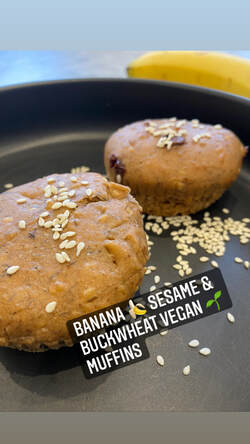
Makes around 15 muffins.
Ingredients
2 medium RIPE bananas, mashed
3/4 cup soy milk
1 teaspoon apple cider vinegar
1/4 cup maple syrup
1 teaspoon vanilla extract
1/4 cup olive oil
1 cup SR flour
1 cup buckwheat flour
2 tablespoons coconut sugar
1 teaspoon baking powder
1 teaspoon bicarbonate of soda
2 teaspoon cinnamon
2 tablespoons toasted sesame seeds
1/4 cup dark chocolate chips
Directions:
1. Preheat oven to 180 degree celsius.
2. Prepare baking try with muffin liners or use a grease a muffin tray with olive oil.
3. In a mixing bowl, mash bananas with a fork, add milk, vinegar, maple syrup, vanilla and olive oil. Mix well with fork or whisk.
4. In a seperate mixing bowl, add flours, baking power, bicarbonate of soda, cinnamon and sesame seeds.
5. Pour dry ingredients into wet and combine well with spatula.
6. Stir through chocolate chips.
7. Fill muffin cases 3/4 as they will rise
8. Bake for around 23 minutes until a knife comes out clean after piercing muffin.
9. Transfer to a cooling rack or plate
Recipe inspired by @ohsheglows
banana vegan muffin, dairy free baking, egg free baking, healthy kids snacks, banana and buckwheat vegan muffin
Banana muffin, vegan muffin, healthy muffin, buckwheat muffins, plant based food, vegan food, plant based food, healthy recipes, vegan recipes
Follow me and join the Planting Nutrition Community
website by Rubi Creations Digital

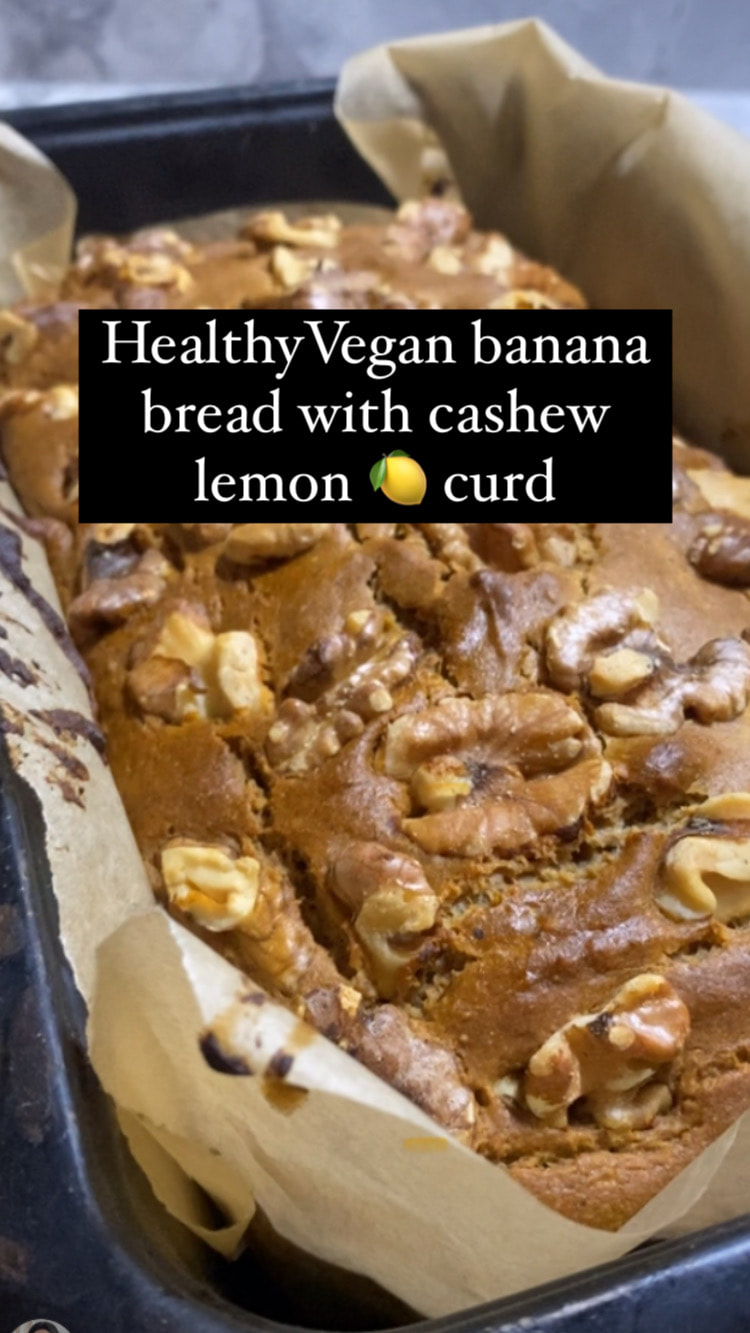
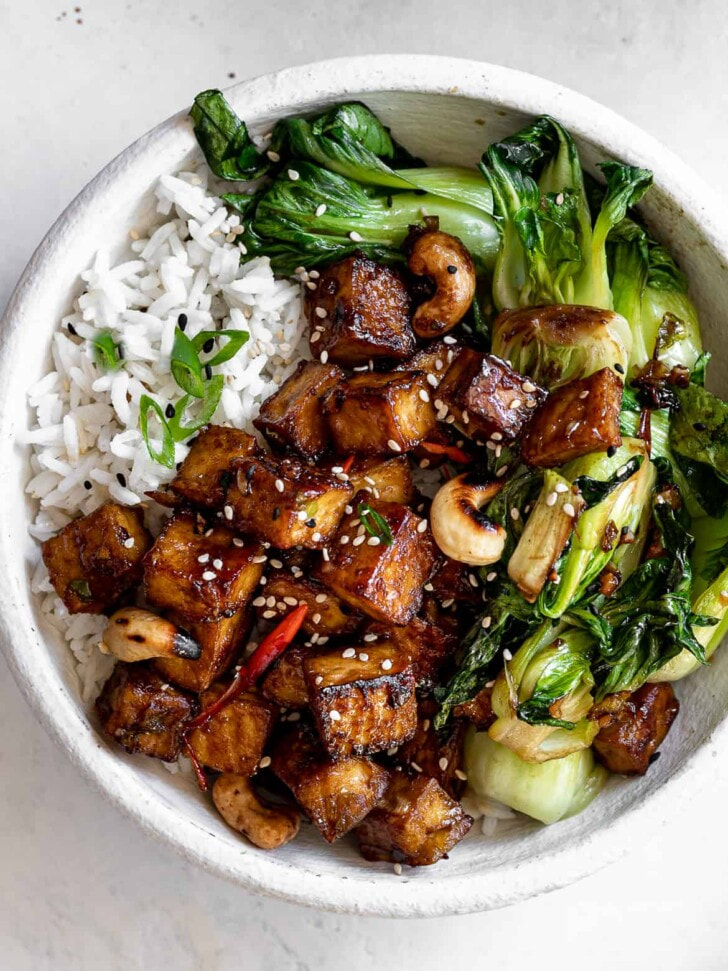
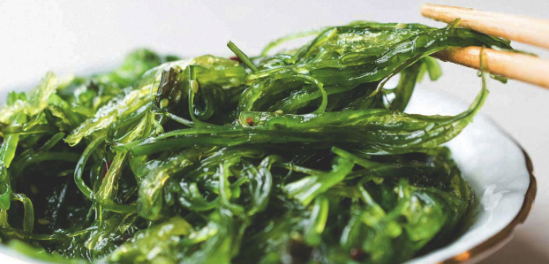
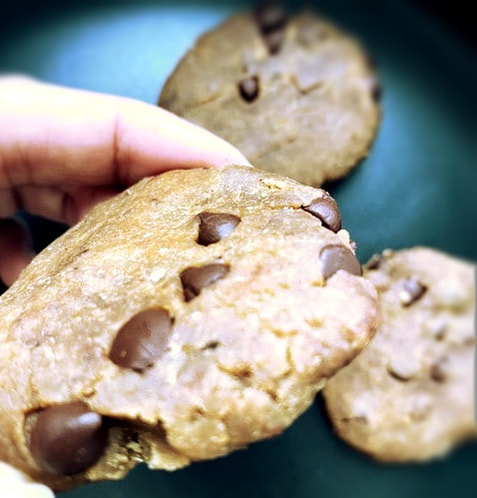
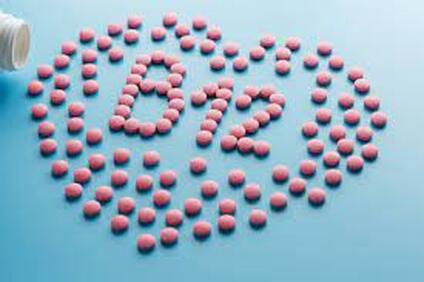
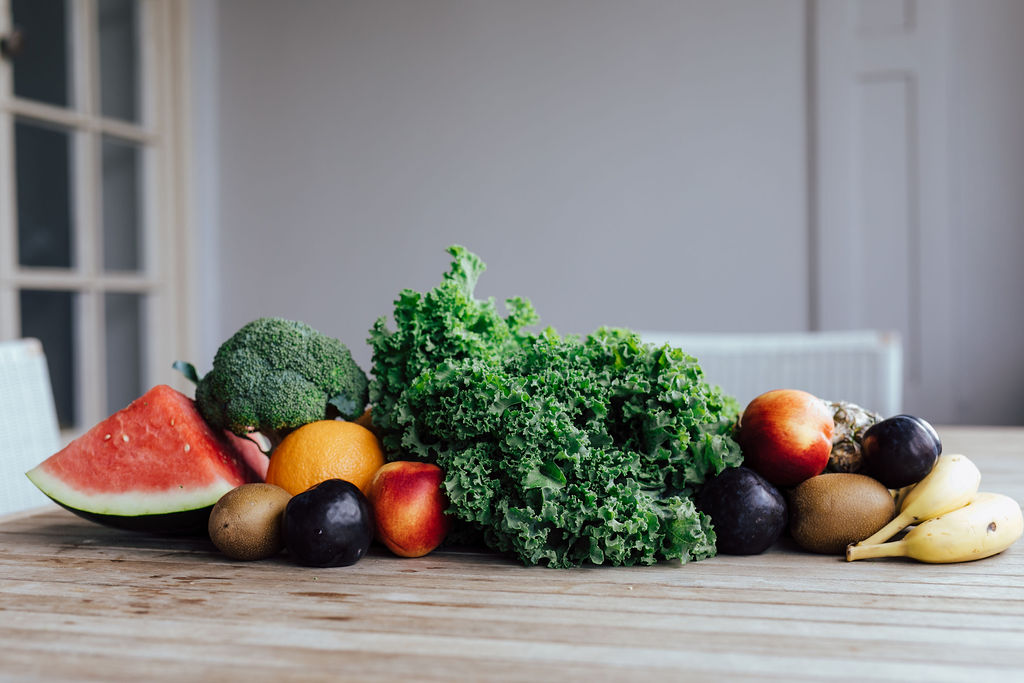

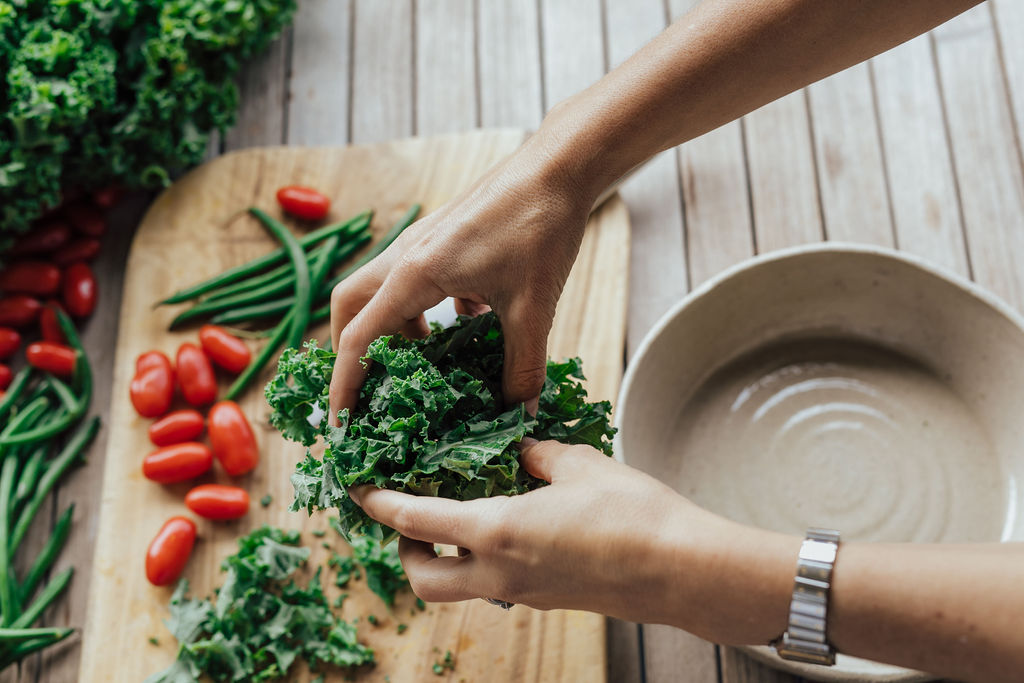

 RSS Feed
RSS Feed

